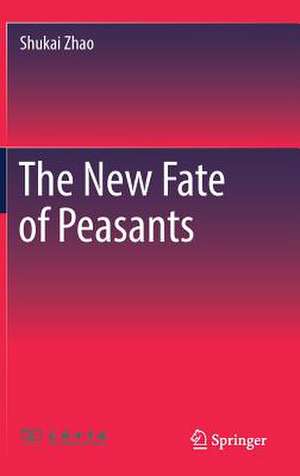The New Fate of Peasants
Autor Shukai Zhaoen Limba Engleză Hardback – 29 noi 2017
| Toate formatele și edițiile | Preț | Express |
|---|---|---|
| Paperback (1) | 386.99 lei 6-8 săpt. | |
| Springer Nature Singapore – 25 dec 2018 | 386.99 lei 6-8 săpt. | |
| Hardback (1) | 394.29 lei 6-8 săpt. | |
| Springer Nature Singapore – 29 noi 2017 | 394.29 lei 6-8 săpt. |
Preț: 394.29 lei
Nou
Puncte Express: 591
Preț estimativ în valută:
75.46€ • 78.18$ • 62.97£
75.46€ • 78.18$ • 62.97£
Carte tipărită la comandă
Livrare economică 21 martie-04 aprilie
Preluare comenzi: 021 569.72.76
Specificații
ISBN-13: 9789811044380
ISBN-10: 9811044384
Pagini: 228
Ilustrații: XXXI, 243 p. 6 illus.
Dimensiuni: 155 x 235 mm
Greutate: 0.56 kg
Ediția:1st ed. 2018
Editura: Springer Nature Singapore
Colecția Springer
Locul publicării:Singapore, Singapore
ISBN-10: 9811044384
Pagini: 228
Ilustrații: XXXI, 243 p. 6 illus.
Dimensiuni: 155 x 235 mm
Greutate: 0.56 kg
Ediția:1st ed. 2018
Editura: Springer Nature Singapore
Colecția Springer
Locul publicării:Singapore, Singapore
Cuprins
Introduction.- Chapter 1: The New Journey.- Chapter 2: The New Life.- Chapter 3: The New Governance.- Chapter 4: The New Epoch.
Notă biografică
Zhao Shukai, born in November 1959 in Laixi of Shangdong Province, is a law PhD, a researcher and an expert who enjoys special government allowance from the State Council. He worked in the Rural Policy Research Office of the Secretariat of the CPC Central Committee from August 1982 to July 1990 and has been working in the Development Research Center of the State Council since August 1990, during which he worked at local level for two years (the Party Committee of Zhuolu County and Zhang Jiakou Municipal Government) and studied abroad for three years (Australian National University, Duke University and Harvard University of America); he used to be China’s Rural Development Project Consultant for UNDP, World Bank and UK Department for International Development). In November 2006, he served as the chief lecturer for the 36th Collective Study of the CPC Central Committee Political Bureau. His main works include Township Governance and Government Institutionalization (The Commercial Press, 2010), Peasant Politics (The Commercial Press, 2011), New Destiny of Peasants (The Commercial Press, 2012), etc.
Textul de pe ultima copertă
This book discusses the historical transformation of the destiny of Chinese peasants under the contemporary political economic conditions, and tries to explore the institutional mechanism behind the formation and maintenance of these conditions. The analysis focuses on the consequences of the great social mobilization brought about by the reform. The phenomenon of migrant workers is the most significant consequence of the change of Chinese peasants’ life courses. The destiny of migrant workers will be the destiny of Chinese peasants. The introduction chapter of this book discusses the historical context and peasants’ fates, their political participation, and citizenship of peasants after they become urban dwellers. Chapter one discusses the social implication and economic consequences of the urbanization of rural population. Chapter two discusses the living conditions for peasants that moved to work in cities, including working environments, living environments, education of their children, and their social networking. Chapter three discusses the challenges that the mobilization of peasants has posed on government policy making and urban managements. Chapter four discusses the latest development in the social mobilization of Chinese peasants.
Caracteristici
Reviews China’s 30-year policy trajectory around the complexity of rural population working in the cities Criticizes some fundamental errors in the state’s policy guidelines in dealing with issues related to migrant workers Calls for a new solution for the realization of peasants’ citizenship in China Includes supplementary material: sn.pub/extras















